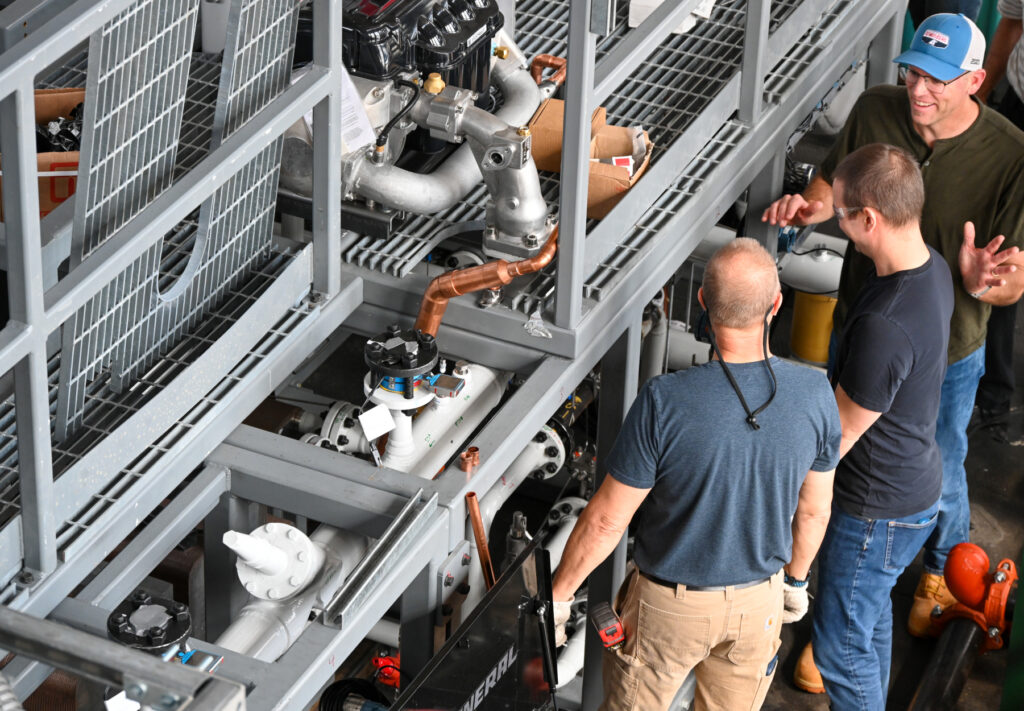
The CSU Energy Institute community is celebrating another achievement toward its mission of fostering the scale up of entrepreneurial technology. A CSU spinoff, AtmosZero, has raised $21 million to accelerate its mission to reduce the carbon footprint of process steam used in industrial manufacturing, food and beverage industries, district heating, and the built environment.
About 8 percent of global primary energy use comes from industrial fossil fuel burning boiler systems, making these systems a perfect target for AtmosZero’s mission to accelerate industrial decarbonization.
This week, AtmosZero announced the close of their series A fundraising round co-led by Engine Ventures and UK-based venture firm 2150 to accelerate the commercialization of its boiler technology, based on new high-temperature heat pump technology invented by AtmosZero and under test at CSU. Conventional heat pump technology currently used for home heating and water heaters cannot generate the high temperatures required for process steam used by industry. AtmosZero’s proprietary technology extracts heat from the air and delivers high-temperature steam with maximum efficiency and zero carbon emissions, allowing companies to replace their existing natural gas and oil boilers quickly and cost-effectively.
“AtmosZero is solving for industrial decarbonization by electrifying the boiler room and building a scalable, drop-in replacement product rather than complex and expensive customized projects,” said Addison Stark, CEO of AtmosZero. “Our vision is to eliminate global emissions from fossil-fueled boilers. The investment today from leading U.S. and European investors is a tremendous validation of our technology and approach to decarbonizing process heat and steam.”
Associate Professor Todd Bandhauer serves as AtmosZero’s chief technology officer and leads the CSU research / development team that includes students from the Walter Scott, Jr. College of Engineering.
“Our investors have recognized that we have a worldclass team working in a worldclass environment at the Powerhouse Energy Campus to address an urgent need,” said Bandhauer. “I came to CSU from an industry background because of the industrial research environment at Powerhouse, which was built on a 30-year history of innovation and collaboration around energy and the environment. We could not have been in this position without all those things in place.”
AtmosZero is one of a collection of clean-tech ventures located in the Powerhouse Energy Campus. Research and office space in the Powerhouse is available for energy companies and startups of all sizes, on both a short and long-term basis. This space is meant to support collaboration between and within clean energy research and entrepreneurship.
“AtmoZero is an excellent example of inspired CSU faculty solving real-world problems and creating industry solutions that benefit our region,” said Cass Moseley, CSU Vice President for Research.
Building on success

In 2023, AtmosZero announced a collaboration with New Belgium Brewing Company, marked by a comprehensive pilot program at New Belgium’s flagship facility in Fort Collins. The company also launched AtmosZero Europe, B.V., its European subsidiary headquartered in Amsterdam. The secured investment will be instrumental in advancing these endeavors and expanding AtmosZero’s influence in the European market.
A recently awarded $3.2 million grant from the U.S. Department of Energy’s Industrial Efficiency and Decarbonization Office will further support AtmosZero in efforts to decarbonize America’s industrial sector.
The AtmosZero series A fundraising effort comes at the heels of big announcements for the CSU Energy Institute community, including a $160 million NSF-funded climate initiative, $8.9 million award for hydrogen fueling stations, a Department of Energy grant for methane emissions, and a federal award for regional electric vehicle charging infrastructure planning.